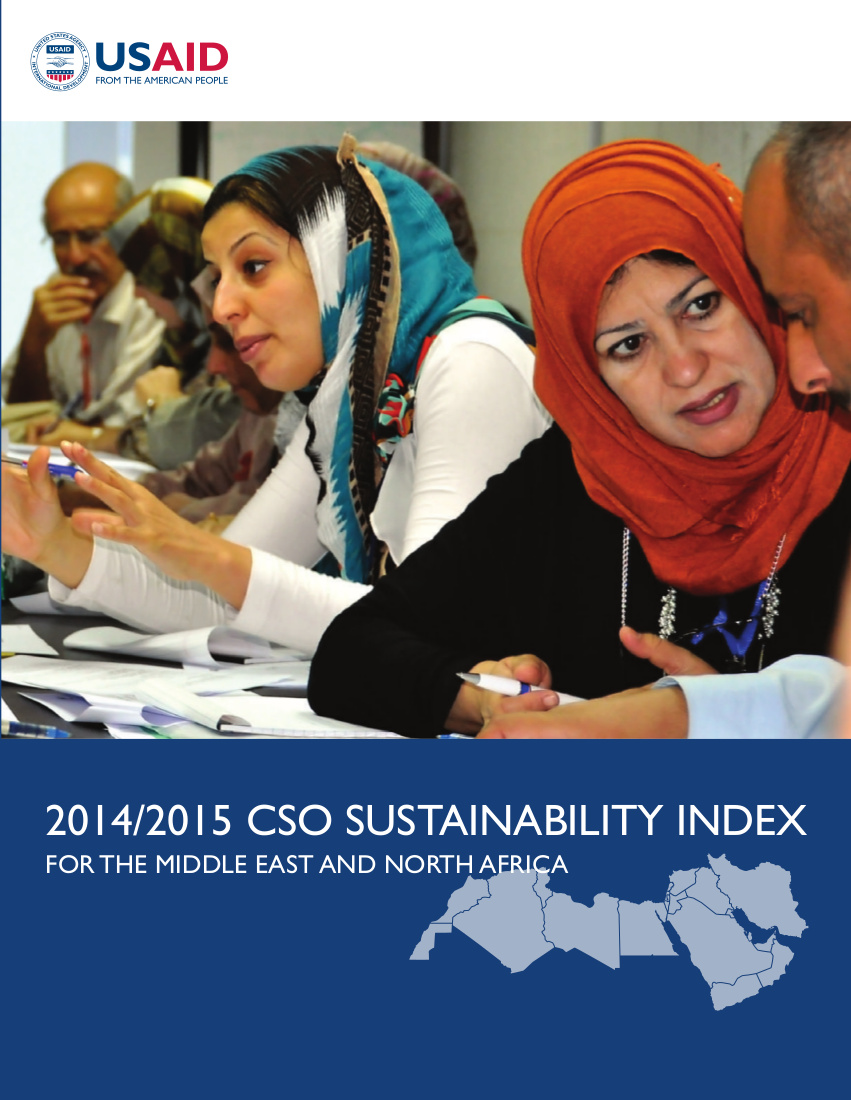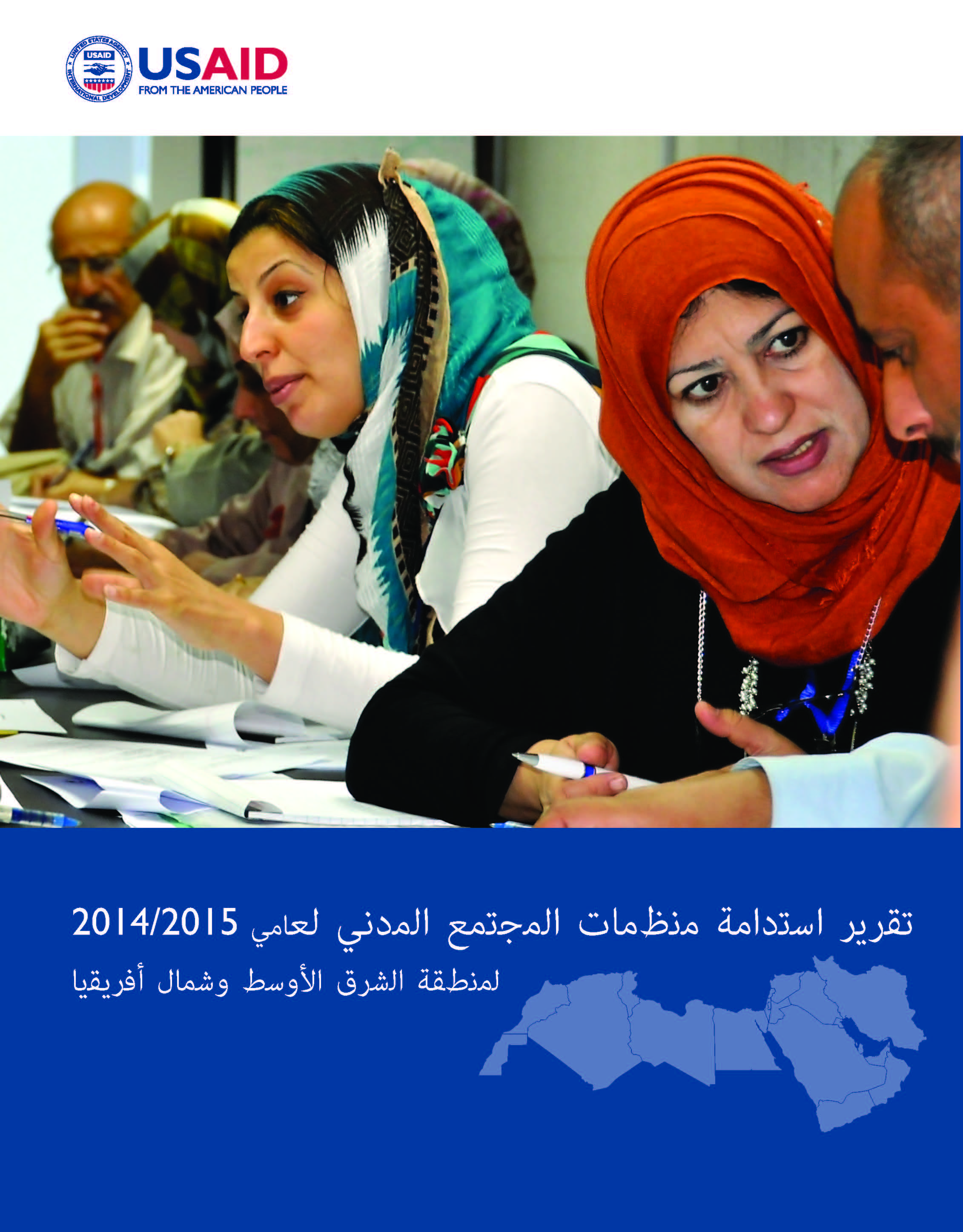- What We Do
- Agriculture and Food Security
- Democracy, Human Rights and Governance
- Democracy, Human Rights and Governance Strategy
- Supporting Free and Fair Elections
- Supporting Vibrant Civil Society & Independent Media
- Protecting Human Rights
- Promoting Accountability & Transparency
- Importance of Democracy, Human Rights, & Governance to Development
- Countering Trafficking in Persons
- Economic Growth and Trade
- Education
- Ending Extreme Poverty
- Environment and Global Climate Change
- Gender Equality and Women's Empowerment
- Global Health
- Water and Sanitation
- Working in Crises and Conflict
- U.S. Global Development Lab
BACKGROUND
The Civil Society Organization Sustainability Index (CSOSI) has been used by USAID since 1997 to assess the sustainability of the CSO sector in 29 countries in Europe and Eurasia. The CSOSI was first applied in sub-Saharan Africa in 2009. In 2011, the CSOSI tool was further applied to seven countries in the Middle East as well as Afghanistan and Pakistan. The Aga Khan Foundation funds CSOSI in the latter two countries as well as in two countries in sub-Saharan Africa. The CSOSI is used by CSO advocates, other development partners, and academics to assess international and regional trends in the civil society sector and to identify common obstacles impeding the sector’s sustainability, such as the legal environment, organizational capacity, and financial viability, as well as to track areas where sustainability has improved.
APPROACH
The CSOSI measures the sustainability of each country’s CSO sector based on the CSOSI’s seven dimensions: legal environment, organizational capacity, financial viability, advocacy, service provision, infrastructure, and public image. The CSOSI’s implementing partners in each country lead the process of organizing and convening a diverse and representative panel of CSO experts. Country panels discuss the seven dimensions for the year being assessed and reach consensus on the scores corresponding to each dimension. The scores are organized into three basic categories representing the level of development of the civil society sector: Sustainability Impeded; Sustainability Evolving; and Sustainability Enhanced. All scores and narratives are then reviewed by a Washington-based editorial committee, assisted by regional civil society experts.
FINDINGS
CSOs in the Middle East and North Africa (MENA) operated in a tumultuous environment during 2014 and 2015, facing challenges ranging from fierce armed conflicts to severe humanitarian and economic crises. The spread of the Islamic State attacks and the group’s recruitment of fighters from abroad intensified security concerns throughout the MENA region and led governments in many countries to adopt new laws and regulations aimed at countering extremist activity. Some of these measures created new restrictions for CSOs, including limits on their ability to receive foreign donor funding. The civil war in Syria, which the Index does not cover, grew in complexity and deadliness throughout 2014 and 2015 and continued to have spillover effects into neighboring countries, including Iraq, Jordan, and Lebanon. Countries in the region faced a range of political challenges as well. Iraq’s government, newly elected in 2014, failed to quell public discontent over corruption and poor public services, leading to widespread public protests in 2015 in which many CSOs took part. Lebanon remained without a president throughout 2014-15, and decision makers largely declined to adopt any new policies, making it difficult for CSOs to engage in effective advocacy. Regional turbulence both contributed to and was exacerbated by economic challenges. Despite the challenges, CSOs in nearly every country covered in this Index enjoyed an improved public image and growing support from the public in 2014 and 2015. In many cases this was due to CSOs’ responsiveness to local needs and greater visibility thanks to increased media coverage. In some cases, financial support to CSOs from local individuals and private entities also increased as government funding dried up due to economic shortages. Nonetheless, while making progress in some areas, CSO sustainability in the Middle East and North Africa region overall faced challenges in 2014 and 2015. All scores—for individual dimensions as well as overall sustainability levels—in all countries remained in the Sustainability Evolving and Sustainability Impeded categories.









Comment
Make a general inquiry or suggest an improvement.